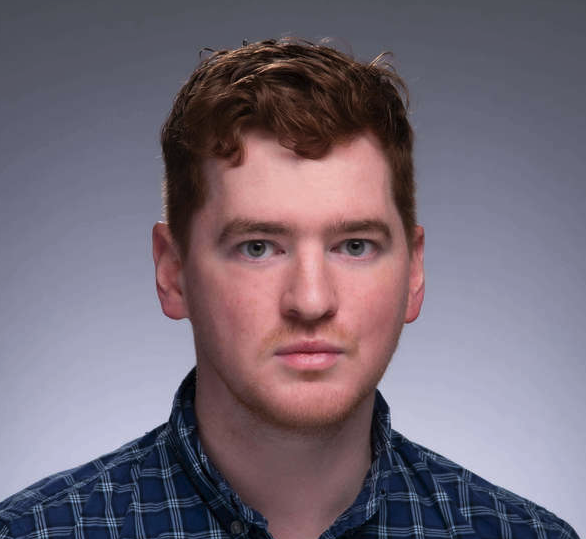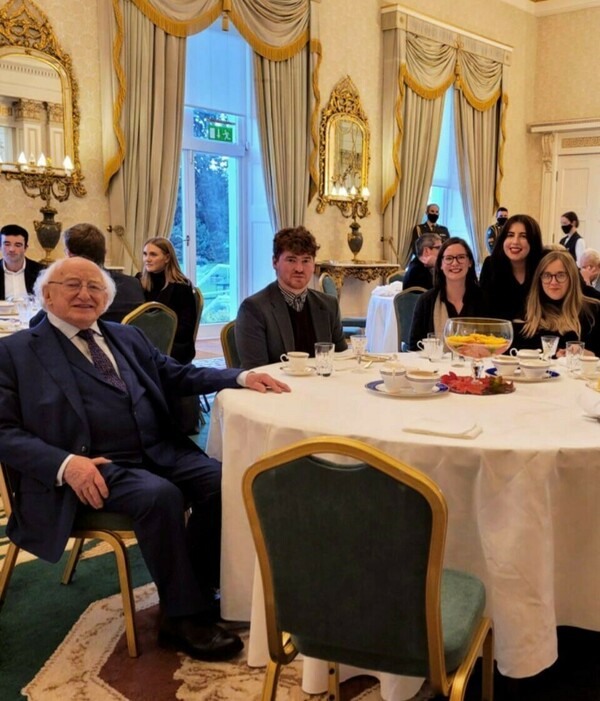
Stephen O'Neill was the National Endowment for the Humanities Fellow for the 2019-2020 academic year at the Keough-Naughton Institute. He is currently an Irish Research Council funded Enterprise Postdoctoral Fellow at the School of English, Trinity College Dublin and the Irish Museum of Modern Art, Kilmainham. His research explores the cultural construction of statehood after the establishment of partition in Ireland.
The pandemic year interrupted Dr. O'Neill's fellowship at Notre Dame. He went home to Ireland during the University's spring break in mid-March and was not able to return for his April workshop and public lecture. It was perhaps some consolation that the Institute featured him in a webinar in November 2020 that was attended by nearly 80 scholars from around the world. [Posted at this LINK.] More recently, he participated as an audience member at November’s Machnamh 100 seminar in Áras an Uachtaráin hosted by Michael D. Higgins (pictured below).
What are you working on?
At Trinity, I’m researching and writing my book Irish Culture and Partition, 1920-55, which is coming out with Liverpool University Press. I’m also writing a couple of articles on the Belfast author Brian Moore, and on memory and the archive in Irish commemorations.
With IMMA I have been working on their commemorations programme, which has involved putting together a panel for the summer school and organising a reading group at the museum. My major project at IMMA for this year is organising the International Conference for 2022, ‘100 Years of Self-Determination’, which is happening from 10-12 November in Dublin.
I am eager to promote our Call for Papers for the conference, with the deadline for submitting abstracts and proposals April 25. The theme of this conference is self-determination, and it will focus on the role of art and artists in the formation of states that emerged in the aftermath of the First World War. It is also situating this work within a global context of artistic responses to emerging nation states and independence movements in this period.
In my spare time, I have also recently made a digital map of the 499 or so people killed during the ‘Belfast Pogroms’ of 1920 to 1922 using a couple of primary sources and the help of more than a few recent books on the early years of partition, especially the work of Kieran Glennon. These deaths occurred during the early years of partition, as the northern state was being set up, but there aren’t many memorials in Belfast to them. I thought about this when walking with a friend around north Belfast, where many of the deaths occurred, and noticed that the site one of the most infamous killings – of the McMahons in Kinniard Terrace – had nothing to mark it.
What are you reading?
I’ve been reading quite a lot of poetry recently, including Padraig Regan’s Some Integrity, Manuela Moser’s Last night, the mountain, and the Lifeboat Press’s Queering the Green: Post-2000 Queer Irish Poetry (ed. by Paul Maddern).
I’ve also finally gotten around to reading a book that has been sitting in my ma’s house in Belfast for years: Pedro Páramo by Juan Rulfo, a magical realist novella about a man who sets off on a journey to find his estranged father, only to discover that his father’s hometown is now filled with ghosts. It was, apparently, an important influence for Gabriel Garcia Marquez’s Cien años de soledad, but closer to home there are some overlaps with Máirtín Ó Cadhain’s Cré na Cille. As a disclaimer I am, of course, reading all of these in translation.
How has life changed since the beginning of the pandemic?
I was lucky to be able to return home to Ireland during the pandemic, although I didn’t have the foresight to bring most of my things back from South Bend as I did. Since then I’ve been grateful to be near family and friends in Belfast, and even being able to return to play football in Antrim for my home club St Brigid’s.
In terms of researching it’s certainly been a strange few years. I’ve been very lucky to have the comforts of home, and for my family to have been relatively unscathed by covid, and in that context it’s difficult to talk about minor inconveniences like wall-to-wall online meetings, cancelled conferences, and library closures. But it's at least tentatively good to see things shifting back to in-person while retaining the connections that were built up during the past few years on zoom. And I hope along with Frank Shovlin in his "Three Questions" column at the start of 2022, that we’ll soon be able to think and speak of the pandemic in the past tense.
